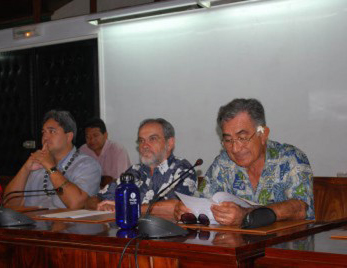
PORT VILA: France’s overseas territories of New Caledonia and French Polynesia have expressed disappointment for not being allowed to take part in the Pacific Islands Forum (PIF) annual summit’s retreat of leaders, a key sequence in the yearly parley.
Both French Polynesia and New Caledonia were granted a special “associate member” status back in 2006, after being observers at the regional 16-nation organisation for the seven previous years.
But this year, the two French Pacific entities had made no secret that they wanted this “associate” membership status to be upgraded, at least by being allowed to take part in the Pacific leaders’ retreat.
“The Pacific Islands Forum Leaders meeting proceeded on Wednesday with the leaders’ retreat, which is reserved for heads of state and government of the member countries.
"French Polynesia, as an associate member just like New Caledonia, was not invited to this meeting”, French Polynesia’s Vice-President Edouard Fritch said in a release in the Vanuatu capital Port Vila.
Fritch said he regretted what he termed the “isolation” to which he and New Caledonia’s President Philippe Gomès were subjected.
“We’re all gathered here to share our experience, but also to comment on the work that has been done by the Forum Secretariat over the past 12e months … But as ‘associate’ members, in effect, we only intervene during speech time and I have had the feeling that it was more like a monologue for me …
Simply excluded
"We are here, we talk about French Polynesia, we talk about the reports, but don’t get a chance to exchange directly with heads of state in plenary session. Simply because the place they meet to exchange views, this is on the side, during their retreat. And we, the ‘associate countries’, we are a little bit excluded from all this”, he said.
Fritch said he did not mean to ask for the “associate membership” (which he said was “not completely satisfactory”) to be changed into a fully-fledged one.
“But at least - and this is what I have asked - that this associate membership status be allowed to evolve and that we could be allowed to be part of discussions of heads of state”, he said, adding he did not believe French Polynesia had to gain independence to achieve this.
He said the associate membership status, which was designed especially to accommodate a request to the Forum backed by metropolitan France five years ago, was “good enough for the family picture”.
But he said he now believed it was time to call on the Forum to “study a way whereby leaders of associate members could be ‘better associated’ to the Forum’s works and retreats”.
Prior to the Forum leaders’ summit, New Caledonia(‘s President Philippe Gomès had expressed confidence that New Caledonia could be allowed to take part in the leaders’ retreat, a move which he said would have allowed his country to sit “on par” with other forum members.
“New Caledonia is part of Melanesia and the Pacific, it’s quite obvious … We have cultural roots and we also have a significant economic weight”, he said, adding his country should have a “full seat” because it wanted to speak in its own voice.
Equivalent status
Gomès said he believed that New Caledonia, because of its current path to greater autonomy (which could lead to a referendum on self-determination between 2014 and 2018, under the Nouméa Accord signed in 1998), in terms of decision-making, New Caledonia was “in an equivalent situation” to the region’s island states.
In the months preceding the summit, New Caledonia’s government had gone to the extent of sending a special envoy around the Pacific to lobby for support to its request.
Speaking from Port Vila on New Caledonia’s public radio, Gomès said there were common challenges and issues such as climate change and the global financial crisis aftershocks that had an impact on the whole region.
Since last year also, Gomès has on several occasions stated that as part of his territory’s “regional integration” push, he wished that within the Melanesian Spearhead Group (MSG, - which comprises Vanuatu, Papua New Guinea, the Solomon Islands, Fiji and New Caledonia’s non-state pro-independence political movement, the FLNKS [Kanak Socialist National Liberation Front]) - New Caledonia should replace FLNKS. - Oceania Flash



